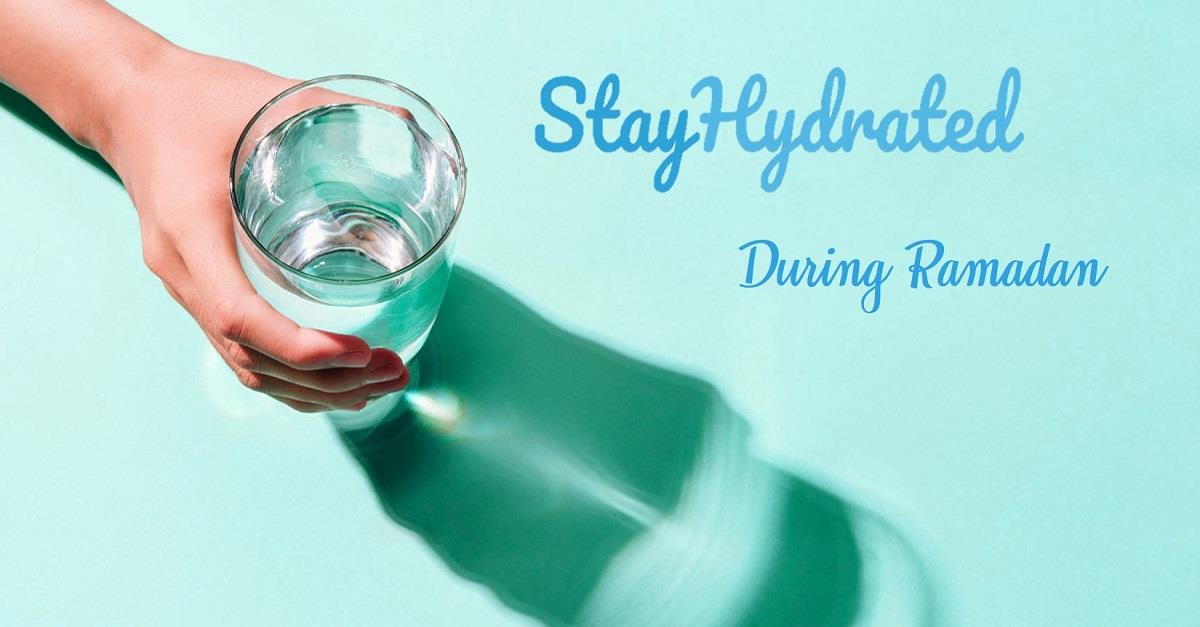
Stay hydrated while you fast this Ramadan
(MENAFN- Mid-East.Info) By Dr. Dana Al Hamwi, Clinical Dietician, India Gate, KRBL Ltd.
Eat right, drink right – health experts and nutritionists have been highlighting the importance of a balanced diet for a healthy body and mind. With over 60% of the human body consisting of water, it is obvious that fluids have to be an integral part of our dietary habits.
But what happens when the Holy month of Ramadan approaches and the spiritual journey includes abstaining from food and water during daylight hours? The secret lies in taking in an adequate amount of water at regular intervals during non-fasting hours. It is not recommended to guzzle fluids and water all at once during Iftar or Suhoor; thinking it will help keep thirst at bay through fasting.
Since Ramadan 2021 falls during some of the hotter weeks of the year, it is essential to bear in mind that the warm and humid weather increases water loss in the body. Furthermore, lack of fluids can lead to dehydration, headaches, digestive problems, constipation, acidity, and more.
Dr. Dana Al Hamwi, Clinical Dietician, India Gate, KRBL Ltd shares tips on how to keep your body well hydrated while fasting during Ramadan:
- The thumb rule of 8-10 glasses per day is true of Ramadan fasting as well albeit the time one gets to consume that much water/fluids is short. Replenishing the body with this standard demand for water at a single time is neither possible nor advisable. Therefore, you should complement your fluid intake by consuming water along with fluid-rich food such as fruits and green salads.
- One superfood that should feature in your meals is chia seeds. They soak up the liquid they are placed in and retain the water. Therefore, as the body digests the seeds, the water is slowly absorbed, keeping hydration level up throughout the day. Add them to your drinks such as laban, lemon water, and herbal teas to replenish fluid content most healthily. To optimize benefits, add chia seeds to a glass of milk during Suhoor to help keep you sufficiently hydrated until Iftar.
- Irrespective of the variety of fluids you consume, they cannot substitute water. Drink at least 1-2 glasses of water every hour between Iftar and Suhoor to make up for the required amount of water for healthy functioning of body and mind. Aerated drinks or soft drinks should be avoided completely, during Ramadan. They are loaded with calories and their high sugar content dehydrates the body.
- Bottled and canned juices should be avoided too as they increase the sugar intake and hardly provide the essential nutrients needed. Instead, opt for freshly squeezed juices and consume them along with the pulp or fiber. Also, water-rich fruits such as watermelon and oranges work wonders when had whole.
- Abstain from caffeine or at least keep it to the bare minimum as tea and coffee have a diuretic effect. This means we have to compensate for the caffeine intake with at least double that amount of water to balance body fluids.
Rhetorical point.
- In addition to fruits such as watermelon, orange, and strawberries, even nutritionally and water-rich ingredients such as quinoa, lettuce and cucumber can make up for the fluid content in the body. By adding these fluid-rich foods to your salads and consuming healthy grain soups each day, your body will be replenished with essential fluids without feeling the burden of gulping them.
- Stay away from high Sodium foods packaged foods, pickles, and canned food. They dehydrate the body, burden the digestive system and also have a diuretic effect on the body.
- Old is gold so follow the age-old traditional way of breaking your fast with dates and Laban or room temperature water. Post-Maghreb prayer starts your main meal with soups or a salad to ensure a healthy start to your mealtimes.
With water, fluids, and fluid-rich foods; it is possible to maintain healthy hydration levels even during Ramadan.
About India Gate and KRBL Group :
India Gate, a benchmark in quality food standards, is a KRBL Group flagship brand. As a global food brand, India Gate continues to earn respect and patronage among consumers world over.
Apart from the newly introduced Quinoa, Chia Seeds and Flax Seeds India Gate also specializes in brown rice and is known in the region for its highest selling India Gate Classic Basmati rice.
KRBL's journey started over 129 years ago as a company that engaged in grain marketing and agro processing. It was later incorporated in 1993 with the objective of processing paddy and with its vast experience and expertise, the miller is now synonymous with basmati rice – favourably positioning Indian basmati on the global food map.
As the world's largest basmati miller and exporter, KRBL is currently present across all the basmati eating regions such as Asia, Middle East, Europe, USA, Canada, and Africa. KRBL is known for its seed development and farmer engagement program and the trust it has earned by implementing the fastest- scalable lab-to-market Public-Private Partnership project with the synonymous 1121 grain.
KRBL has won many accolades throughout the years with its most recent award being the awarded the coveted APEDA Award Golden Trophy for the largest exporter of Basmati rice. Additionally, it has received in 2016 Guinness World Records for the heaviest bag of rice. In 2015, it received the prestigious NAAS India Silver Jubilee Award for Basmati rice trade development.

Legal Disclaimer:
MENAFN provides the
information “as is” without warranty of any kind. We do not accept
any responsibility or liability for the accuracy, content, images,
videos, licenses, completeness, legality, or reliability of the information
contained in this article. If you have any complaints or copyright
issues related to this article, kindly contact the provider above.


















Comments
No comment